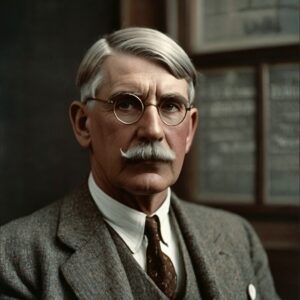At Perspectives Forge, we explore the legacies that have the power to transform society and ask ourselves, “What can we learn from these influential figures to create a better tomorrow?” In the realm of education, John Dewey emerges as a seminal thinker whose innovative ideas have reshaped how we perceive teaching and learning. As a pioneer of progressive education, Dewey challenged traditional methods that emphasized rote memorization and passive absorption of information. Instead, he championed a vision of education that focuses on experiential learning and critical thinking, preparing students for meaningful engagement in a democratic society. Join us as we delve into the life and impact of this remarkable educator, exploring how Dewey forged a new educational paradigm that continues to inspire educators and learners around the world today.

A Radical Shift in Educational Philosophy
Born in 1859 in Burlington, Vermont, John Dewey emerged as a leading philosopher and educator during a time when traditional education was heavily focused on memorization and passive learning. In stark contrast, Dewey envisioned an education system that would prepare students for real-life challenges, fostering critical thinking, problem-solving skills, and social responsibility.
Dewey’s educational philosophy was deeply rooted in the belief that education should be experiential and student-centered. He argued that learning should not merely be about the absorption of facts, but about engaging with the world, asking questions, and applying knowledge in practical contexts. His approach sought to create a learning environment where students could develop into thoughtful, active participants in a democratic society.
Dewey’s Contributions to Education
John Dewey’s innovative ideas about education were grounded in several key principles that reshaped the educational landscape:
Experiential Learning: Dewey believed that the most effective learning occurs through direct experience. He advocated for an experiential learning model where students engage with their environment, participate in hands-on activities, and reflect on their experiences. This approach not only makes learning more engaging but also helps students connect theoretical knowledge to real-world applications.
Student-Centered Education: Dewey emphasized the importance of catering to the interests and needs of students rather than adhering strictly to a predetermined curriculum. He argued that education should be tailored to the individual, allowing students to explore their passions and curiosities. This student-centered approach promotes intrinsic motivation and fosters a lifelong love of learning.
Critical Thinking and Problem Solving: Dewey championed the idea that education should cultivate critical thinking skills. He believed that students should be encouraged to ask questions, think critically about issues, and engage in problem-solving. By promoting inquiry-based learning, Dewey sought to prepare students to navigate complex challenges and contribute thoughtfully to society.
Democratic Education: At the core of Dewey’s philosophy was the belief that education is fundamental to democracy. He argued that schools should not only transmit knowledge but also foster democratic values such as social responsibility, cooperation, and active citizenship. Dewey believed that education should empower students to participate meaningfully in their communities and society at large.
Integration of Subjects: Dewey promoted the idea that learning should not be compartmentalized into isolated subjects. He advocated for an integrated curriculum that connected different disciplines, reflecting the interconnectedness of knowledge in the real world. This holistic approach encourages students to see the relevance of their learning across various contexts.
The Impact of Dewey’s Reforms
John Dewey’s contributions to education have had a lasting impact on how we understand and practice teaching and learning. His ideas laid the groundwork for the progressive education movement, which emphasized the importance of preparing students for democratic citizenship and practical problem-solving.
Dewey’s emphasis on experiential learning led to the development of teaching methods that prioritize hands-on activities, group projects, and real-world applications. These methods have become integral to many modern educational practices, fostering an engaging and relevant learning environment.
His belief in student-centered education has reshaped curricula across the globe, promoting the idea that students should play an active role in their own learning journeys. This approach has led to the adoption of inquiry-based learning, project-based learning, and personalized learning models that prioritize student agency.
Furthermore, Dewey’s vision of democratic education continues to inspire educators to create inclusive and equitable learning environments where all voices are heard and valued. His advocacy for critical thinking and social responsibility encourages educators to prepare students not just for academic success but for active and informed participation in their communities.
A Legacy That Continues to Inspire
John Dewey’s revolutionary ideas about education remain profoundly relevant today. His vision of an experiential, student-centered, and socially responsible education system has inspired countless educators, reformers, and policymakers around the world. Dewey’s emphasis on preparing students for real-world challenges and promoting democratic values is more crucial than ever in a rapidly changing society.
In an age where information is abundant but critical thinking skills are often lacking, Dewey’s philosophy serves as a reminder of the importance of fostering a culture of inquiry and reflection in our educational institutions. His belief that education should be a collaborative process that engages students in meaningful dialogue and exploration is a guiding principle for many modern educators.
Moreover, Dewey’s vision for a more equitable and inclusive education system continues to motivate efforts to reform educational practices and policies. His advocacy for social responsibility and active citizenship encourages educators to cultivate a sense of community and civic engagement among their students.
Forging Education for a Better Future
John Dewey’s contributions to education challenged traditional paradigms and forged a new perspective on how we teach and learn. At Perspectives Forge, we believe that his work offers valuable lessons in the importance of fostering critical thinking, experiential learning, and democratic values in our education systems. Dewey’s legacy reminds us that education is not just about acquiring knowledge; it is a transformative process that prepares individuals to contribute positively to society.
As we continue to navigate the complexities of the modern world, Dewey’s revolutionary ideas about education serve as a powerful blueprint for building a better future—one where learners are empowered to think critically, engage with their communities, and shape the world around them.
